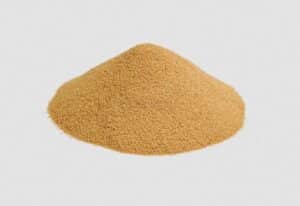Upcycling chemistry meets innovative coatings
The coatings industry has adopted a steady pace on its transition towards more bio-based, carbon-friendly and resource-efficient solutions. Whereas this journey can be somewhat challenging in the field of technical coatings, there is certainly a myriad of opportunities in the decorative market segment. Binder systems from plant-based sources have replaced a great deal of fossil-derived resins, and a variety of degradable, natural pigments have gained presence beyond niche applications.
As far as texturing and reinforcement are concerned, the industry has conventionally used mineral particles. Hardness and resistance paired with appealing white shades and competitive pricing have made them an unquestioned top choice for most manufacturers. Only recently, plant-based alternatives have awakened innovators’ curiosity. “Creating a fully bio-based particle that meets – and even exceeds – the requirements of modern coatings, both in terms of technical features and value-for-money has been quite a process”, explains Kathrin Schilling, founder and director of BioPowder.

Olea FP Olive Stone Functional Particles
The company has specialised in upcycling a unique raw material: olive stones, a by-product of the olive oil industry. Over the years, the team has experimented with a wide range of raw materials, all leftovers from fruit processing such as almond and pistachio shells, apricot stones, ginger fibres, rice husk and avocado peel.
Olive stones when used in superior quality, are an excellent raw material for resistant lightweight particles with an appealing shape and colour. In addition, they originate from a carbon-neutral ecosystem in which foodstuff and by-product value chain emissions are offset by the olive trees’ carbon capture. Essentially a source of biocarbon, olive stone particles are multifunctional. In coatings, they are compatible with different resin systems (e.g. conventional and biobased epoxy, polyurethane and acrylic formulations) and can improve a product’s carbon footprint, lifespan, impact and abrasion resistance and curing times. As Kathrin Schilling points out, “BioPowder’s mission consists in identifying applications where olive stone particles can add maximum value to an end product, both in technical and environmental terms”.
To achieve this goal, the company offers a high degree of customisation. Particle ranges can be adjusted to meet diverse requirements with regard to viscosity, texture and surface effects of coating formulations. The lignocellulosic composition of olive stone particles and the associated reactivity can be adjusted/suppressed by way of surface functionalisation. This can reduce the need for compatibilisers and boost hydrophobicity, e.g. for barrier or protective coatings. Furthermore, the company has launched a line of biobased colour particles to amplify the aesthetic options for decorative applications.
In an attempt to promote biobased innovation, BioPowder recently unveiled their collaboration with F/LIST, a leading Austrian manufacturer of decorative high-performance coatings. The company serves the luxury business jet, private jet and residential markets with a unique combination of traditional craftsmanship and cutting-edge material science. The R&D experts and inhouse futurelab called F/LAB at F/LIST developed the product line F/LAB Aenigma Eco. It includes decorative coatings with customised pattern engraving and sustainable pigment finish. The biobased laminate is created from the fusion of traditional jewellery techniques, aerospace technology and cutting-edge chemistry. It is exquisitely handcrafted and is mythical, legendary and very enigmatic. Diverse materials such as plant-based pigments, upcycled olive stone or mother-of-pear are brought together, and given a new life.
With its plant-fibre based carrier substrate F/LAB Aenigma Eco immobilises approx. 400 litres of CO2/m² material from the atmosphere and stores it as biogenic carbon. Possible applications range from wall and divider coverings over inlays and furniture fronts.
The F/LAB project showcases the potential of carbon-friendly innovation in coatings and high-quality decorative applications. BioPowder’s mission is to be the go-to partner for companies on their journey towards biobased product lines. Thanks to dedicated specialists, the team can solve formulation challenges that oftentimes arise with the shift towards coatings with a reduced environmental impact. Last but not least, the company’s newly created Aplication Lab acts as a catalyst for eco-innovation beyond the upmarket segment. Available guide formulations for VOC-free, biobased coatings can accelerate product design, shorten the time-to-market of new developments and ultimately contribute to “eco” being the norm, not a niche.

